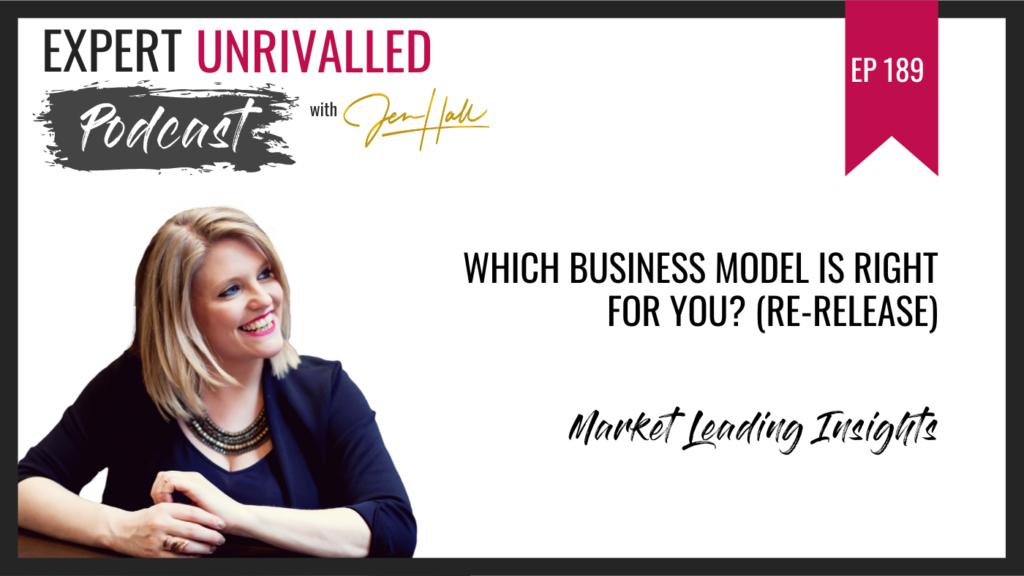In a world where there only seems to be 3 types of business model – 121 vs group vs membership, I want to show you that there is more than one way to peel an orange!
For instance, when it comes to scaling, ‘online courses’ isn’t the only way – hiring support, outsourcing, training team members and hiring other experts can also be a great way to grow AND serve your clients more powerfully.
In this episode, I share the idea of an ‘Evolved Business Model’ and the key things to consider when creating your own.
Listen using the player above or read the blog below:
Which business model is right for you?
There are many elements you need to consider when choosing your business model. You might need to fit your business around children, family life and what you want your priorities to be. It may be that you do not want a passive income business model. No income is entirely passive.
We need to take into account our business journey and expertise to understand which business model is best for you. It took me a while to figure out. This was partly because I was following what others were doing. It’s taken me a long time to recognise I can choose the model that I want and it doesn’t need to be like anything that is out there.
You can either go down the group or 1-1. Each of these has its pros and cons. If you’re selling 1-1 then you will hit a capacity issue eventually, no matter how you charge. Equally, the group programmes need a lot of effort in launching to bring in new clients.
What I talk about is an evolved business model. The right business model for this stage of the business and what will that look like in the future? It’s about looking at both. Then looking at how you can evolve that business model over time depending on where you want to go. I’ve done this with my Elevate programme. It’s looking at how you scale your business for both you and your clients.
Consider all the elements
It’s not a case of picking one of the three business models out there. You can create anything you like. The Elevate programme is a hybrid of a mastermind but with a 1-1 group programme. You can blend and change models. You don’t have to do things the way everyone else does it. By changing your business model to the benefit of your clients can give you a helpful USP.
One of the biggest questions about Elevate is about it being a group programme. It is not a group programme and you are not spoon-fed material. You don’t get left behind if you can’t keep up and you get the attention that is sometimes missed in a group. It also means materials are tailored to the client’s business. It is less about keeping you busy and keeping your business moving.
So my programme is designed specifically for clients to get the most out of it. You don’t need to go through everything in the programme, only what you need at that time. The roadmap is adapted to suit the business so there is no shoe-horning. I’m telling you this to show how you can bend the rules for your business model. It’s about looking at the customer experience – what’s not working for them that they have tried already.
Here are some of the things that you need to take into account when you’re creating your business model.
Financial gain
What do you want to be getting per client? There are two factors here. Think about how big is your current audience size. If it’s small then you probably want to sell high ticket. Who you sell it to is the difference between selling something for £10 and £10,000. The bigger the problem, the more they are willing to spend.
If you have a larger audience of qualified leads, then you might be better with a membership or passive income model at a lower price. People don’t buy because it’s cheap, they buy because it solves a problem. But you will have more time for the deliverables. As you become more well-known your audience size will grow and can decide on which model you may move into in the future. So look at both size and type.
Who you are selling to
You also need to look at the kind of person you are selling to – whether that is corporate or B2C. I count lots of small B2B clients as B2C because it is corporates who have the bigger budget for high-ticket. The average corporate spend is £10,000. You are looking at a larger amount per client.
You can also sell high-ticket to the solo person. Corporates are likely to pay more. Realistically in B2C spending does not go that high, usually. It also depends on your background and experience. Are you at the level you need to be to sell at the corporate level?
How you sell to each audience type is also different. Selling to corporates is very different to selling B2C. B2C is about attraction marketing and selling to them before the call. Rather than finding out who the decision maker is, getting sign-off and pushing proposals. What do you want your selling style to be? And what do you want that to look like?
You can also have two revenue streams, selling both to corporate and B2C. For me, selling to corporate does not set me on fire. I love working with coaches, consultants and experts. It’s where I can add more value and I enjoy seeing growth in that business. You have to decide for yourself.
How do you like to deliver?
I know many people who shut down memberships because the reward wasn’t there. They wanted to work closer with their clients. Again, it’s about finding the balance if you want to do both. You can have a programme that has a mix between a 1-1 and membership and still get high-ticket monthly recurring income.
Think about your business in terms of rewards and the types of clients you want to work with. I have a client who doesn’t want to work with people who have tech issues and that’s the clients she is currently attracting. This can happen when your messaging isn’t on point. It’s about getting people at the right stage. Someone running a business for some time will have sorted most of the tech issues. Whereas, someone new will have more tech struggles.
You want to make sure the experience is as rewarding as possible. Making sure that you’re fulfilling your core desires in how you’re contributing to other people’s lives. Take this into account for your business model.
Time
How much time do you have to deliver right now? A blended business model of membership and 1-1 might work for you. It could also be that when you have other commitments, you need to portion up your time in the right way for you. Not everyone has the same life and commitments. Create a business model that works for you.
For many people, you need to balance time with audience size. You might want to do a membership but will resent that if you have a small audience, with few people in your membership working as hard as if you have a high-ticket client. Go back to that financial gain and balance that so you don’t feel resentful.
Your experience and expertise
You cannot in full integrity create purely self-study programmes unless you have taken people through a proven method first. You need to know that people will get the results. I prefer that you don’t go straight to a passive income product. Instead, make sure you’re building something sustainable that people get results from. A marketing leading business isn’t built from making a lot of money, it’s about the loyalty of your clients.
You need the experience behind you so that your clients are happy with their experience and they get the best results. Do you have the experience to do what you want to do? Or do you need 1-1 to get the market research first? I did five live rounds of a course, and even on the last round I still switched modules around. You can’t get that feedback when you are distant from your product. When you run things live, you know what does and doesn’t work.
Useful links:
Book a Call with Jen – bit.ly/claritycallpodcast
Send your emails to jen@jen-hall.com
Available on Apple iTunes, Spotify & Stitcher (Just search Expert Unrivalled Podcast)

